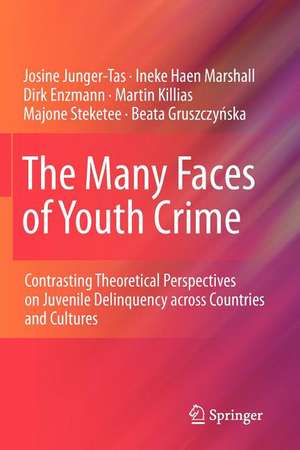The Many Faces of Youth Crime: Contrasting Theoretical Perspectives on Juvenile Delinquency across Countries and Cultures
Autor Josine Junger-Tas, Ineke Haen Marshall, Dirk Enzmann, Martin Killias, Majone Steketee, Beata Gruszczynskaen Limba Engleză Paperback – 21 sep 2012
| Toate formatele și edițiile | Preț | Express |
|---|---|---|
| Paperback (1) | 393.13 lei 6-8 săpt. | |
| Springer – 21 sep 2012 | 393.13 lei 6-8 săpt. | |
| Hardback (1) | 651.02 lei 6-8 săpt. | |
| Springer – 17 sep 2011 | 651.02 lei 6-8 săpt. |
Preț: 393.13 lei
Nou
Puncte Express: 590
Preț estimativ în valută:
75.22€ • 78.55$ • 62.12£
75.22€ • 78.55$ • 62.12£
Carte tipărită la comandă
Livrare economică 15-29 aprilie
Preluare comenzi: 021 569.72.76
Specificații
ISBN-13: 9781461458401
ISBN-10: 1461458404
Pagini: 384
Ilustrații: VIII, 367 p. 63 illus.
Dimensiuni: 155 x 235 x 20 mm
Greutate: 0.54 kg
Ediția:2012
Editura: Springer
Colecția Springer
Locul publicării:New York, NY, United States
ISBN-10: 1461458404
Pagini: 384
Ilustrații: VIII, 367 p. 63 illus.
Dimensiuni: 155 x 235 x 20 mm
Greutate: 0.54 kg
Ediția:2012
Editura: Springer
Colecția Springer
Locul publicării:New York, NY, United States
Public țintă
ResearchCuprins
Introduction.- Substance Use.- Delinquency.- Victimization Experiences.- Social Response and Reporting.- Family.- Schools and the Education System.- Lifestyle.- Self Control and Attitudes Towards Violence.- Neighborhood.- Macro-Sociological Perspectives on Individual Problem Behavior.- Theoretical and Policy Implications.
Textul de pe ultima copertă
This book presents the first comprehensive analysis of the second International Self-Report Delinquency study (ISRD-2). An earlier volume, Juvenile Delinquency in Europe and Beyond (Springer, 2010) focused mainly on the findings with regard to delinquency, victimization and substance use in each of the individual participating ISRD-2 countries. The Many Faces of Youth Crime is based on analysis of the merged data set and has a number of unique features: The analyses are based on an unusually large number of respondents (about 67,000 7th, 8th and 9th graders) collected by researchers from 31 countries; It includes reports on the characteristics, experiences and behaviour of first and second generation migrant youth from a variety of cultures; It is one of the first large-scale international studies asking 12-16 year olds about their victimization experiences (bullying, assault, robbery, theft); It describes both intriguing differences between young people from different countries and country clusters in the nature and extent of delinquency, victimization and substance use, as well as remarkable cross-national uniformities in delinquency, victimization, and substance use patterns; A careful comparative analysis of the social responses to offending and victimization adds to our limited knowledge on this important issue; Detailed chapters on the family, school, neighbourhood, lifestyle and peers provide a rich comparative description of these institutions and their impact on delinquency; It tests a number of theoretical perspectives (social control, self-control, social disorganization, routine activities/opportunity theory) on a large international sample from a variety of national contexts; It combines a theoretical focus with a thoughtful consideration of the policy implications of the findings; An extensive discussion of the ISRD methodology of ‘flexible standardization’ details the challenges of comparative research.The book consists of 12 chapters, which also may be read individually by those interested in particular special topics (for instance, the last chapter should be of special interest to policy makers). The material is presented in such a way that it is accessible to more advanced students, researchers and scholars in a variety of fields, such as criminology, sociology, deviance, social work, comparative methodology, youth studies, substance use studies, and victimology.
Caracteristici
Explores the link between national policies and juvenile delinquency in a large number of countries Documents several innovations in large-scale comparative survey methodology Contains a wealth of comparative data on youth, including data related to current politically important issues such as gang involvement, immigration and the influence of the country of origin. Uses the data presented to the test the universal applicability of a number of mainstream criminological theories Includes supplementary material: sn.pub/extras












